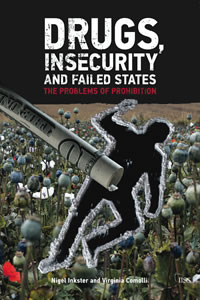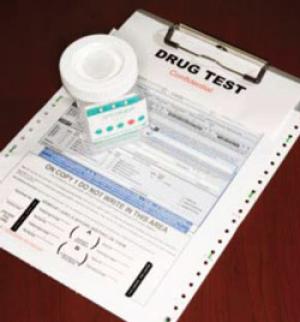The Arkansas medical marijuana initiative is ready for a final push toward victory as the clock ticks down toward Election Day. It could use some money for some late ads, though.
With marijuana legalization initiatives heading to the ballot, some with a good chance of passage, and with growing international support for a real debate on prohibition, people are talking about drug policy like they never have before.
Just over a month out, medical marijuana and marijuana legalization initiative campaigns are heating up.
Mitt Romney (mis)speaks out on medical marijuana, the LA dispensary ban is repealed, and the feds keep on grinding away at medical marijuana providers with another conviction in Montana and a lengthy prison sentence in Michigan. And that's just for starters.
The Massachusetts drug lab testing scandal continues to reverberate. Now, the lab analyst at the center of it has been arrested, and courts are scheduling special sessions to free the more than 1,100 behind bars in cases where she was involved.
Canada has responded to the emergence of a new synthetic stimulant drug the old-fashioned way: by banning it.
The association representing British Columbia municipal governments has endorsed a resolution calling for marijuana decriminalization. That puts it in line with more than two-thirds of the province's residents, but not with the federal government in Ottawa.
Coca production is up in Peru for the sixth year in a row, responding to thriving demand from Brazil and Europe. Colombia is barely holding on to first place now.
A last ditch effort to block an Arkansas medical marijuana initiative from appearing on the November has failed.
A former Pennsylvania prosecutor gets caught peddling pot, and a TSA agent and an Alabama cop head to prison for taking bribes from drug dealers.
Medical marijuana has made great inroads in parts of the United States. With the exceptions of Idaho, Utah, and Wyoming, the West is medical marijuana country. The Northeast is also trending that way, with Massachusetts looking likely to join the ranks come election day, while Michigan represents medical marijuana's first acceptance in the Midwest.
The South remains the last region of the country without a medical marijuana state, but that could well change on November 6, when voters in Arkansas will have the chance to approve a medical marijuana initiative there.
Sponsored by
Arkansans for Compassionate Care, the
Arkansas Medical Marijuana Act (Issue 5 on the ballot) would allow patients suffering from a specified list of diseases and conditions to use and possess marijuana on a doctor's recommendation after registering with the state Health Department. Patients would obtain marijuana from state-regulated non-profit dispensaries. Only those patients living more than five miles from a dispensary could grow their own or have a caregiver grow it for them, and they would be limited to six plants per patient.
The campaign is counting on the compassion of Arkansans to bring it to victory in November and is highlighting the plight of patients like
Emily Williams, a Fayetteville wife and mother diagnosed with lymphoma in 2010. Williams underwent extensive chemotherapy, resulting in extreme nausea, headaches, and general lethargy. She was unable to eat, drink, or take any medications because of the side effects, and anti-nausea agents her doctors prescribed didn't help.
"I had an intravenous medication, a pill, a patch, and a tablet which dissolved under my tongue, but none of them changed any of my symptoms," she said, explaining how she reluctantly turned to medical marijuana. "I knew I was putting my family at risk. We could have been arrested or lost our property, but I was dying and nothing else was working."
Medical marijuana worked. "Within 10 minutes, my headache was gone, my nerves were relaxed, the pain in my body was gone, and the nausea was totally gone, it totally disappeared," she said. "It allowed me to live a normal life. I was able to eat dinner with my family, and to be more active."
But the risk from marijuana's illegality was too much for Williams. She refused to use it during her last round of chemotherapy because of fears for her family, and paid a price. The anti-nausea drugs still didn't work, she lost ten pounds in a week, and her recovery was unnecessarily prolonged.
"Marijuana helped me live a normal life during my battle with cancer, but it was too risky," she explained. "I was offered marijuana during my last treatment, but I couldn't bring myself to put my family in jeopardy. I would have recovered much more quickly. I would have been able to eat, sleep, and continue through my treatment without struggling as much. Patients shouldn't suffer because of the law. Why can't there be some other possibility?"

cancer patient Emily Williams (arcompassion.org)
The campaign is counting on stories like Williams' to turn a neck-and-neck race into a victory on November 6. The only recent poll on the initiative, a
Talk Business-Hendrix College poll in July, had it eking out a one-point lead at 47% to 46%, with 7% undecided, but the campaign said it thought support had only increased since then.
"I suspect that number has changed quite a bit," said campaign strategist Chris
Kell. "Once we got the signatures, we also got a phenomenal amount of attention, and it's hard to say no to the stories of these patients. Now, people are hearing about the initiative, they're visiting the web site, and we're going to be tugging pretty heavy at their heartstrings."
It's all out for the final push to victory now, he said.
"We've overcome so many hurdles, we're really excited, and we're ready to take this campaign to the ground,"
Kell exclaimed. "The response so far has been very favorable, and I'm confident we can get this thing passed in November. We hope to be a model for all the other Southern states."
The final hurdle overcome was a lawsuit filed by the social conservative Arkansas Family Council Action Committee that sought to keep the measure off the ballot by challenging the ballot language. The state Supreme Court rejected that effort last week.
"This is about legalizing marijuana," Family Council Action Committee head Jerry Cox told the
Ozarks Times in August when the challenge was filed. "It's just a matter of legalizing it in degrees. I think you'd find, if you asked around, that a lot of the same folks who support this support total legalization of marijuana for any purpose. I believe their real agenda is to have marijuana be as legally available as tobacco."
The
Marijuana Policy Project contributed money to help gather the signatures to get the measure on the ballot and helped with the court challenge, but the campaign is now looking for more money to get some advertising on the airwaves before the election.
"All the money we were expecting from various folks got tied up with that lawsuit,"
Kell explained. "Nobody wanted to give money until they were sure it was actually on the ballot. Now that it is, we will have an effort to raise enough money so that we can hopefully have a paid media campaign in the last week."
If they do manage a paid media campaign, it looks like it will be the only one. Aside from the Family Council, organized opposition is scarce.
"We haven't seen any real law enforcement opposition yet, and some on the ground will tell us quietly they are for it, that they don't want to have to arrest people who have small amounts for medicinal purposes," said
Kell. "The only organized opposition even on a minor level is coming from people who benefit from keeping this illegal, treatment centers and that kind of thing."
Kell wasn't too worried about the family values crowd and its use of the bully pulpit to encourage "no" votes.
"We're not really all that concerned with them," he said. "When you go into that voting booth, that's a private deal. You can have a faith leader tell you one thing, but you can still vote your conscience. Plus, we have our own clergy getting the word out, and if you have any compassion at all, it's hard to say no."
Arkansas is generally considered a conservative state, but that's not completely true,
Kell said, noting that it had elected and reelected liberal Bill Clinton governor, then followed that up by electing social conservative Mike
Huckabee as his replacement.
"Arkansas is a strange state politically," he said. "We've been getting as much help from the conservative side as from the liberals. People could cross party lines to vote for this in large numbers. The voters here are pretty pragmatic and well-informed when they vote. I think they will vote for compassion."
In little more than a month, we will see if Arkansas will lead the South toward the medical marijuana promised land.
back to top
Dear Drug War Chronicle reader:
With marijuana legalization initiatives heading to the ballot, some with a good chance of passage, and with growing international support for a real debate on prohibition, people are talking about drug policy like they never have before. And so two of our three new offers for donating members come from the academic world rather than activist reformer circles:
Marijuana Legalization: What Everyone Needs to Know and
Drugs, Insecurity and Failed States: The Problems of Prohibition.
This is also a time of continuing outrages in the government's drug war, including the federal campaign against medical marijuana. And so our third new offer is the DVD
Lynching Charlie Lynch, by director Rick Ray, telling the story of one of California's most respected and responsible medical marijuana providers, now facing time in federal prison. (Follow the three links above for Drug War Chronicle reviews of each of these works.)
Donate $35 or more to StoptheDrugWar.org, and you will be eligible for a complimentary copy of any one of these items. Donate $65 or more and you'll be eligible for any two. Donate $95 or more and you can receive all three. (Each of these items, and each combination along with other available items, can be found in the "membership premiums" section of our
online donation form, under the indicated minimum total.)
At a time like this -- when people are talking about drug policy like never before -- the movement's internet strategy is also more important than ever before. So please support our work with a generous donation by credit card or PayPal today. You can also donate by mail -- info below.
Lastly, please note that even with a nonprofit, bulk discount, we spend a significant amount to purchase these items and send them to you -- if you can afford to donate more than the minimum, or to supplement your donation with a continuing monthly contribution, I hope you'll consider doing so. If gift items are not important to you, I hope you'll consider sending a donation that's entirely for our work.
Donations to our organization can be made online at
http://stopthedrugwar.org/donate, or they can be mailed to:
DRCNet Foundation (tax-deductible), P.O. Box 18402, Washington, DC 20036; or Drug Reform Coordination Network (non-deductible for lobbying), same address. (Contact us for information if you wish to make a donation of stock.)
Thank you for standing with us to stop the drug war's cruelties and meet the opportunity this time offers to make a brighter future. And don't get discouraged by the challenges our movement and the cause are currently facing:
Time, and the truth, are on our side!
Sincerely,

David Borden, Executive Director
StoptheDrugWar.org
Washington, DC
http://stopthedrugwar.org
back to top
Just over a month out, medical marijuana and marijuana legalization initiative campaigns are heating up.
Arkansas
See our feature article this week on the Arkansas initiative and its prospects
here.
California
All was quiet on the Proposition 36 three-strikes initiative front.
Colorado
Last Thursday,
a group of armed forces veterans came out for Amendment 64. The group, Veterans for 64, was formed after the state denied a plea to add post-traumatic stress disorder (PTSD) to its list of ailments for which medical marijuana can be used. "The state's failure to act is an effective denial of this compassionate petition," said Vietnam veteran Bob Wiley. "Our only option is to support Amendment 64, which will ensure that
Coloradans 21 and older who suffer from PTSD will no longer be subject to arrest and prosecution for using marijuana."
Also last Thursday,
a study found that one in 20 Colorado arrests are marijuana-related. The study, conducted by the Colorado Center on Law and Policy for the Drug Policy Alliance found that police forces in the state spend about 4.7% of their budgets enforcing marijuana prohibition, the courts spend 7%, and the corrections system spends 2%. All told, the study concludes that legalizing small amounts of marijuana will save Colorado taxpayers $12 million a year in the beginning and up to $40 million a year in later years.
On Tuesday,
Republican state Sen. Shawn Mitchell endorsed Amendment 64. "It's clear the war on drugs isn't working, and we need to try different approaches to this in society," said Mitchell, who has long had a libertarian-style view of drug use, based in part on his own family's experience. "Watching a brother battle addiction has made me question the worth of legal penalties," he said. He joined former US Rep. Tom
Tancredo and a handful of other Republican supporters organized by the
Republican Liberty Caucus at a rally at the capitol that day.
On Wednesday,
the Amendment 64 campaign released a new TV ad arguing that money from marijuana sales should go to Colorado schools, not Mexican drug cartels. "We all know where the money from non-medical marijuana sales is currently going," the narrator says as dollar signs cascade down from Colorado and into Mexico. "It doesn't need to be that way. If we pass Amendment 64, Colorado businesses would profit and tax revenues would pay for public services and the reconstruction of our schools. Let's vote for the good guys and against the bad guys -- let's have marijuana tax money go to our schools rather than criminals in Mexico."
Massachusetts
On Wednesday,
opponents of Question 3 gathered in Somerville to discuss the measure. Some 20 people, including Somerville Police Chief Thomas
Pasquarello, gathered for a talk by Cory
Mashburn, Director of the Somerville Office of Prevention, part of the Somerville Health Department. Dispensaries will resemble "candy stores or a 7-11," he told the small crowd.
Montana
All was quiet on the I-124 front.
Oregon
Last Thursday,
the Yes on 80 campaign criticized a raid on a major medical marijuana provider. The campaign addressed that day's raid on the Human Collective in
Tigard, saying "prohibition is the problem, regulation is the solution."
On Wednesday,
the Associated Press reported on money problems for Measure 80. The campaign had only $1,800 in the bank, the AP reported, citing potential large donors' doubts about the measure's ability to win and skepticism about the measure's main backer, Paul Stanford. The measure is trailing in the polls.
Washington
On Sunday,
the Columbian (Vancouver, WA) endorsed I-502.
As of Monday,
the I-502 campaign had raised $4 million, including $670,000 donated last week by Progressive Insurance founder Peter Lewis, who has now thrown in a total of $1.55 million. The campaign used some of that money for a $700,000 TV ad buy for use in the final week before the election.
Also on Monday, the campaign won the endorsement of King County Sheriff Steve
Strachan, who is running for re-election. "I think the current situation is bad for the rule of law, bad for the criminal justice system and and it sends a bad message to our kids," he said.
Strachan's opponent, longtime Sheriff's spokesman John
Urquhart, previously endorsed I-502.
On Tuesday,
the Spokane Spokesman-Review endorsed I-502.
On Wednesday,
Republican US Senate hopeful Michael Baumgartner endorsed I-502, giving the campaign one of its highest-profile Republican supporters yet. He is running a long-shot bid to defeat Democratic US Sen. Maria
Cantwell. I-502 is "taking a different approach to a very expensive drug war, and potentially a better approach,"
Baumgartner said. "They've checked all the boxes as far as what you would want to see happen in terms of provisions to keep it away from children and limiting access in the public space. I've just been impressed with the initiative and the people running it."
(This article was published by StoptheDrugWar.org's lobbying arm, the Drug Reform Coordination Network, which also shares the cost of maintaining this web site. DRCNet Foundation takes no positions on candidates for public office, in compliance with section 501(c)(3) of the Internal Revenue Code, and does not pay for reporting that could be interpreted or misinterpreted as doing so.)back to top
Mitt Romney (mis)speaks out on medical marijuana, the LA dispensary ban is repealed, and the feds keep on grinding away at medical marijuana providers with another conviction in Montana and a lengthy prison sentence in Michigan. And that's just for starters. Let's get to it:
National
On Monday,
GOP presidential candidate Mitt Romney weighed in on marijuana policy. Asked by the Denver Post what he thought about Colorado's medical marijuana industry, Romney responded, "I oppose marijuana being used for recreational purposes and I believe the federal law should prohibit the recreational use of marijuana." Later the same day, his campaign clarified to the Washington Post that "Governor Romney has a long record of opposing the use of marijuana for any reason. He opposes legalizing drugs, including marijuana for medicinal purposes. He will fully enforce the nation's drug laws, and he will oppose any attempts at legalization."
Arizona
Last Thursday,
the state ACLU joined a lawsuit supporting the Arizona Medical Marijuana Act. The lawsuit, filed by White Mountain Health Center, seeks to compel county and state officials to move forward with the dispensary permitting process. Maricopa County Attorney Bill Montgomery has refused to issue the documentation to any proposed dispensaries in Maricopa County because he claims the law is preempted by the federal Controlled Substances Act. The lawsuit lists Montgomery, Maricopa County, and the state Health Department and its director, Will Humble, as defendants. A hearing is set for October 19.
California
On Tuesday,
the LA city council voted to repeal its recent ban on dispensaries. The 11-2 vote came after activists gathered enough signatures to put a referendum repealing the ban to a direct vote. Rather than hold a March election that could give an okay to dispensaries, the council is counting on federal enforcement to accomplish what it hoped to achieve with its ban. "That is our relief," Councilman Jose
Huizar said of the DEA raids and threat letters to dispensaries that began last week.
Last Tuesday,
the DEA raided an Anaheim dispensary, the Live Love Collective, seizing two kilos of dried marijuana, 75 kilos of marijuana-laced edibles, 900 grams of hash and a kilo of marijuana gel, according to DEA officials. The shop had been warned by the feds that it was violating federal law in November 2011 and was also among 128 dispensaries issued "cease and desist" orders by the city of Anaheim.
Connecticut
On Monday,
the state's medical marijuana law went into effect. Doctors will now be able to go online at the Department of Consumer Protection and begin the registration application for qualifying patients. This is the first step in the fledgling program; the agency has until July 1 to submit new regulations to the General Assembly on how it will be dispensed.
Michigan
On Monday
, the Ann Arbor city council postponed action on amending its licensing ordinance. The suggested amendments including removing language suggesting involvement in regulating the industry by city staff, setting a cap of 20 on dispensaries in the city, and licensing 10 dispensaries. The council has steadfastly failed to move on the ordinance revisions since they were proposed at its January meeting, and they could die if not acted on within the next six months.
Also on Monday,
a Monroe County caregiver was sentenced to 10 years in federal prison. Gerald Duval
Jr. and his son Jeremy had been raided by the DEA and charged with federal marijuana cultivation and trafficking offenses. They were convicted after a trial in which Michigan's medical marijuana law, with which they were in compliance, could not be mentioned. Jeremy Duval was set to be sentenced Tuesday, but there is no word yet on his sentence. Americans for Safe Access called the
Duvals' case "another tragedy from President Obama's war on medical marijuana."
Montana
Last Wednesday,
the Montana Cannabis Association asked the state Supreme Court to reconsider its September ruling that a ban on marijuana sales does not violate the constitutional rights of registered users or providers. The ruling overturned a lower court decision to block part of lawmakers' restrictive rewrite of state regulations, and sent the case back to District Court with new instructions. The association argued that a new state law should be held to a higher standard of review. The Supreme Court decision is in abeyance until the justices address the motion and formally send the case back to the lower court.
Last Thursday,
a medical marijuana provider was found guilty in federal court of multiple federal charges, including conspiracy to manufacture, possess and distribute marijuana and firearms charges. Chris Williams was the greenhouse operator for Montana Cannabis, where DEA agents seized 950 plants in one of the March 2011 raids that swept the state, decimating its nascent medical marijuana industry. As per usual, he wasn't permitted to argue that he followed state laws regulating medical marijuana. He said he would appeal. One of his partners in Montana Cannabis, Tom
Daubert, recently received a probationary sentence after pleading guilty, but another set of partners, the
Flor family, weren't so fortunate. They all got prison sentences, and 68-year-old Richard
Flor died in federal prison earlier this summer.
(This article was published by StoptheDrugWar.org's lobbying arm, the Drug Reform Coordination Network, which also shares the cost of maintaining this web site. DRCNet Foundation takes no positions on candidates for public office, in compliance with section 501(c)(3) of the Internal Revenue Code, and does not pay for reporting that could be interpreted or misinterpreted as doing so.)back to top
Court administrators in Massachusetts are scrambling to set up special court sessions to address the cases of more than a thousand people imprisoned after being convicted of drug crimes based on lab evidence submitted by Annie
Dookhan, the now disgraced former state crime lab analyst.
Dookhan herself was arrested last Friday for her fraudulent work at the lab, as the scandal continues to reverberate across the state's criminal justice system.
According to State Police reports obtained by the
Boston Globe,
Dookhan has admitted not performing proper lab tests on drug samples for "two or three years," forging colleagues' signatures, and improperly removing evidence from storage. Citing the same reports, the
Boston Herald reported that
Dookhan had admitted to "intentionally turning a negative sample into a positive a few times" and to "
dry-labbing" samples, where she classified samples as drugs without actually testing them.
"I messed up bad, it's my fault,"
Dookhan told police, explaining that "she did what she did in order to get more work done."
Dookhan's misconduct, which first came to light in June 2011, has already shaken the Dept. of Public Health, whose commissioner, John Auerbach, has resigned, as have two other managers at the Hinton Laboratories facility in Jamaica Plain where the lab was located. The crime lab was consolidated earlier this year into the Dept. of Public Safety as part of a budgetary move.
The incident has also raised the question of
systemic issues affecting the crime lab. In internal emails
leaked to the Globe, laboratory staff went on record as far back as 2008 describing "the situation in the evidence office [as] past the breaking point." That was before some of the now former management at Hinton took those positions, though not before Dookhan. The Globe article describes "a staff drowning in work, instances of misplaced evidence in crime cases, and mounting frustrations over the Patrick administration’s seeming indifference."
Attorney General Martha Coakley and the State Police charge that Dookhan's mishandling of drug evidence is a crime under the state's broadly written witness intimidation law. She is also charged with falsifying academic credentials for claiming a master's degree in chemistry from the University of Massachusetts-Boston, a degree which the school said it never issued.
Dookhan tested some 60,000 drug samples in 34,000 criminal cases during her nine years at the now shuttered lab. Some 1,141 people are currently serving drug sentences in state prisons or county jails in cases where she had a hand in testing the drug evidence. It is not known how many of those cases have been tainted by Dookhan's actions.
Now, the state court system is beginning to deal with the fallout. Twenty defendants jailed pending trial have already been released, and hearings will begin in mid-October to hear motions to put the sentences of already-convicted inmates on hold and to request bail.
One defense attorney, Bernard Grossberg, who has already seen one client's sentence put on hold because Dookhan was involved in his case, told the
Associated Press that judges hearing the cases in the special sessions would need to hear little more than that Dookhan was involved in the testing.
"My feeling is as soon as they call the case, if Dookhan's name is on the drug certificate, nothing further needs to be asked and the sentence should be put on hold immediately," Grossberg said. "Later on, you can figure out motions to withdraw guilty pleas or upset convictions."
The cases of the people currently serving time after conviction where Dookhan was involved are only the beginning. Gov. Patrick Deval (D) has said he wants to deal with them first, then the cases of people who have already done their time and those currently awaiting trial.
back to top
The Canadian government has banned MDPV (methylenedioxypyrovalerone), a synthetic stimulant commonly found in "bath salts" drugs. The ban went into effect last Wednesday, the same day it was announced by Health Canada.

now banned in Canada (wikimedia.org)
"Our government is committed to protecting hardworking Canadian families and keeping our streets and communities safe," said Health Minister Leona
Aglukkaq in a
statement. "That's why we have moved quickly to make the illicit drug known as "bath salts" illegal to possess, traffic, import or export, unless authorized by regulation."
The
criminalization of
MDPV -- it is now a Schedule I controlled substance, like heroin and cocaine -- had been a promise of the Conservative government of Prime Minister Stephen Harper.
Aglukkaq said in July that regulation was forthcoming.
All activities involving
MDPV are now illegal, except for research and scientific activities, which must be authorized by regulation. That means that people seeking to use and distribute it will have to resort to underground markets, something that police spokesmen who lauded the move don't seem to understand.
"Today's announcement by the Government of Canada to add
MDPV in Schedule I of the Controlled Drug and Substances Act is an important step in stopping organized criminal groups from acquiring and profiting from this illegal substance," said Staff Inspector Randy Franks of the Canadian Association of Chiefs of Police and Acting Chair of the Canadian Association of Chiefs of Police Drug Abuse Committee.
But as
Marni Soupcoff noted in a
National Post op-ed critical of the ban, Franks was both taking credit where it was not due and making unwarranted assumptions about how drug markets work.
"The substance, which is a key ingredient in the drug known as 'bath salts,' was obviously not illegal before the ban,"
Soupcoff wrote. "So it's circular to credit the ban for stopping the acquisition of something illegal. My bigger problem with the quote is the notion that making a substance illegal stops organized criminals from profiting from it. This is precisely the opposite of how things have gone with alcohol, cocaine, heroin, methamphetamine, marijuana and pretty much every other illicit drug or beverage in history."
Instead of prohibiting a relatively new and uncommon drug, Canada could have gone a more rational, public health-oriented way,
Soupcoff suggested.
"What else could Canada have done to try to mitigate harm from
MDPV?" she asked. "How about public health and education initiatives? Maybe monitoring
MDPV sellers to ensure compliance with existing laws (investigating instances of fraud, false advertising, etc.) and creating open forums for
MDPV buyers to report complaints, adverse reactions, etc. Heck, Health Canada could even have formally declared the stuff dangerous, no good, terrible, very bad and to be avoided by those who know what’s good for them."
But instead Canada gets a new addition to its list of banned substances -- and a new, underground criminal market to supply it.
back to top
Municipal leaders across British Columbia last week endorsed a resolution calling for the decriminalization of marijuana. The move came at the meeting of the Union of British Columbia Municipalities, which has represented the interests of BC local governments for more than a century.
"Whereas marijuana prohibition is a failed policy which has cost millions of dollars in police, court, jail and social costs; and whereas the decriminalization and regulation of marijuana would provide tax revenues," the resolution read, "therefore be it resolved that
UBCM call on the appropriate government to decriminalize marijuana and research the regulation and taxation of marijuana."
The "appropriate government," of course, would be the federal government of Prime Minister Stephen Harper, which has made it clear it is not interested in decriminalization and earlier this year toughened criminal penalties for some marijuana cultivation offenses. But former BC Attorney Gene
ral Geoff Plant was among those urging delegates to send a message to Ottawa.
The municipalities should support the resolution to join a "growing chorus of voices" across the country to show Harper that "people are calling for change," he said in remarks reported by the
Vancouver Sun.
"This shows that although this is a federal law, it's municipalities that bear the brunt of paying for those laws," marijuana activist Dana Larsen said after the vote. "When we're talking about decriminalization, you want to take the major users off the front lines in the war on drugs."
Larsen is leading his own effort to decriminalize in BC. He is
laying the groundwork for doing a decriminalization initiative signature drive a year from now.
Dr. Evan Wood, professor of medicine at the University of BC, said the vote was "a symbolic gesture" toward ending a black market that sees $2.7 billion annually goes organized crime.
"It will have a profound impact on BC," he said. "We have been living with the violent, unintended consequences of marijuana [prohibition]. It's certainly not too late. It's absurd we've been flushing time and money down the toilet… this decision is long overdue."
Nearly two-thirds (65%) of voters across Canada support marijuana decriminalization, according to a July
Reid Ipsos poll. In BC, that figures rises to 69%.
back to top

coca leaf statures, Rio Apurimac Valley (stopthedrugwar.org)
Coca cultivation in Peru increased again last year, up 5.2% over 2010, according to the
2011 coca monitoring survey conducted by the United Nations Office on Drugs and Crime and the Peruvian government. That was the sixth straight year of increases in coca cultivation and leaves Peru just behind Colombia when it comes to acres planted.
The survey estimated Peruvian coca planting at 157,000 acres, with government-led eradication efforts destroying only about 25,000 acres, down 14% from the previous year. The
UNODC estimated total coca leaf output of 131,3000 tons, up 4.3% over 2010.
Half of the Peruvian crop is planted in the
Apurimac,
Ene, and
Mantaro valley region in the southeast, but the biggest increase in cultivation came in the northern states of
Bajo Amazonas,
Maranon, and
Putumayo, with a regional increase of 40.4%. Production in those states is on the increase to meet the demand for cocaine and crack cocaine in Europe and Brazil, which is the second leading consumer country after the United States.
"Drug traffickers are becoming more efficient," said
Flavio Mirella, the head of the agency's Peruvian office, at a Lima press conference. "Traffickers need less coca leaf to produce more cocaine. Routes of supply are diversifying and producing areas are getting closer to certain routes of exit" toward Brazil and through Bolivia to Brazil and beyond.
Guerrillas of the leftist Shining Path have also been involved in the coca and cocaine trade, and have stepped up attacks on Peruvian police and military this year. President
Ollanta Humala has vowed to increase both eradication and the presence of the state in remote, guerrilla-infested coca production areas.
back to top
The Arkansas Supreme Court Thursday rejected a bid to keep the Arkansas Medical Marijuana Act off the November ballot. That means voters there will have the chance to make it the first state in the South to embrace medical marijuana.
Although the act, to be known as Issue 5 on the ballot, was qualified for the ballot after
Arkansans for Compassionate Care met all state requirements, the conservative Coalition to Preserve Arkansas Values had sought to block it on the grounds that its ballot statement does not adequately explain that patients could still face federal prosecution.
But the state high court wasn't buying.
"We hold that it is an adequate and fair representation without misleading tendencies or partisan coloring," the court wrote in its
opinion. "Therefore, the act is proper for inclusion on the ballot at the general election on November 6, 2012, and the petition is therefore denied."
The coalition also argued that the ballot question doesn't adequately describe other aspects of the proposed law, including a provision allowing minors to use medical marijuana without seeking parental consent, but the high court wasn't buying that, either.
"Here, after reviewing the ballot title of 384 words, we conclude that the title informs the voters in an intelligible, honest and impartial manner of the substantive matter of the act," the court said.
The court decision was met with relief and elation by Arkansans for Compassionate Care and the
Marijuana Policy Project, which had funded the effort to the tune of $251,000.
"We at the Marijuana Policy Project are very proud to support Issue 5 and Arkansans for Compassionate Care and are glad that the state Supreme Court saw fit to dismiss this baseless challenge," said
MPP communications director Morgan Fox. "The people of Arkansas deserve a chance to have their voices heard, just as seriously ill Arkansans deserve a chance to live normal lives without being treated like criminals."
"The tightly regulated system that would be implemented by the passage of this initiative would provide relief to numerous patients suffering from severely debilitating conditions while taking resources out of the hands of criminals and increasing public safety. This is not a partisan issue," continued Fox. "It is a matter of compassion. Hopefully other states in the region will take their cue from Arkansas and begin to explore similar policy alternatives to putting sick people in jail."
Under the proposal, qualifying health conditions would include cancer, glaucoma, HIV, AIDS and Alzheimer's disease. The proposal also would allow qualifying patients or a designated caregiver to grow marijuana if the patient lives more than five miles from a dispensary.
Medical marijuana is also on the ballot this year in Massachusetts, while in Montana, an initiative that would undo the gutting of that state's program by the legislature is also on the ballot.
back to top
A former
Pennsyvlania prosecutor gets caught peddling pot, and a TSA agent and an Alabama cop head to prison for taking bribes from drug dealers. Let's get to it:
In
Bellefonte, Pennsylvania,
a former Centre County assistant DA was arraigned Tuesday on charges he distributed marijuana. Former Assistant DA Steve Sloane faces seven felony counts after he got caught accepting
Fedex packages from California that contained drugs. Sloane has admitted he had been addicted to
Oxycontin and also admitted receiving several packages containing
hydrocodone pills and marijuana from an old friend in California. Sloane denied selling pot to anyone, but police interviewed several witnesses who said they bought from him. He is currently free on a $100,000 bond.
In Birmingham, Alabama,
a former Jasper police officer was sentenced last Wednesday to 15 months in federal prison for accepting a bribe from a drug dealer. Scottie Wilkins, 30, had borrowed money from the dealer, who was on probation, then paid him back by selling him drugs out of the evidence room. He also took a bribe from the dealer to help him out with a probation matter.
In New Haven, Connecticut,
a former TSA officer was sentenced Tuesday to six years and four months in federal prison for accepting bribes to allow prescription pain pills to travel unimpeded through airport security. Jonathan Best, 31, had pleaded guilty in April to conspiracy to distribute and to possess with intent to distribute
oxycodone. Best admitted accepting cash from a drug dealer to allow
oxycodone pills through airport security and agreed last year to travel to Connecticut to help the trafficker launder drug proceeds. Two other former TSA officers, a former New York police officer and an ex-Florida state trooper have also pleaded guilty in the case.
back to top













